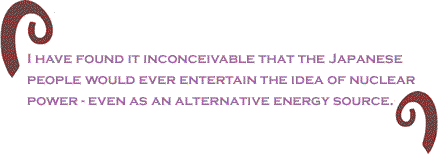|
Note:
Ms. Rogers column �A View
from the Battlefield� will appear in BC
on a regular basis.
The
Japanese people got hit with a double whammy of somewhat
natural origins. I say somewhat natural because I believe
these catastrophes are directly linked to global warming.
As Japan was reeling from an earthquake and tsunami, it
and the rest of the world are bracing for a more directly
man-made calamity, a nuclear meltdown at the Fukushima Daiichi
nuclear plant.
Currently,
Japanese officials estimate at least 21,000 people are dead
or missing from the March 11 earthquake-tsunami tragedy.
Damages are estimated at $250 billion making the disaster
the most costly ever. It will take years to rebuild the
physical structures and much longer to heal the people�s
spirit.
I
have found it inconceivable that the Japanese people would
ever entertain the idea of nuclear power - even as an alternative
energy source. The cities of Hiroshima and Nagasaki were
the epicenter of the atomic bomb dropped in 1945 by the
U.S. The horrific vaporization of people and the vast destruction
that followed are not ancient world history. The remnants
of radiation poisoning are still prevalent and reparations
to victims and their families are no real consolation.
The
question in the public domain seems to focus on how we can
make the nuclear plants in this country safer in the wake
of the Fukushima. I think that it is absolutely the wrong
question. It�s like asking how we can make playing with
fire in a dynamite boat safer.
Much
of the nuclear industry is too greedy and too insensitive
to human life to be given control over nuclear power. They
are too irresponsible to hold the planet in their hands
and deal with something as deadly as nuclear energy. To
maintain maximum profits, safety protocols and regulations
are circumvented or totally ignored. We have every right
to fear for our lives and for our future. And we have every
right to stop the proliferation of these plants. .
A
number of the lethal accidents in the energy arena are preventable
if companies would invest in maintenance instead of lining
their deep pockets and if the regulatory bodies were more
vigilant in their enforcement of regulations and laws. The
world has witnessed the tragic deaths of workers and well
as ecological destruction of entire communities whether
it�s drilling for oil or mining for coal.
The
Union of Concerned Scientists is the leading science-based nonprofit working for a healthy
environment and a safer world. The group just released a
report that was already in the works long before the recent
problems at Fukushima. The report likened the actions of
plant owners to playing �nuclear roulette.� The report cited
14 near-misses in 2010 that should have been avoided had
those companies corrected the known problems in a timely
way.

As
always, I ask readers to follow the money. Weakening the
various regulatory commissions are the legislators who get
contributions from the very people they are supposed to
be regulating.
A
potent example of this kind of obscene relationship is the
reign of Pietro �Pete� Domenici who managed to get himself
at the head of two powerful Senate committees with direct
control over budgets and regulations of the energy bosses.
From 1979-2008 (longest term ever served in the state of
New Mexico�s history), Domenici was showered with monies
from energy corporations for doing their bidding. In 1998,
after the companies complained to him about how regulations
were hampering their ability to do business, Domenici threatened
to slash the budget of the Nuclear Regulatory Commission
by 40% unless they bowed down to the nuclear industry -
which they did.

Informed
observers of the energy arena are now openly reminiscing
about the accidents at Three Mile Island in 1979 and Chernobyl
in 1986. The Japanese government is frantically doing what
it can to prevent a Chernobyl-like meltdown but no one can
predict how the nuclear reactors at Fukushima will respond
to trial-and-error methods of containment (reminds
one of BP�s actions after the spill in the Gulf Coast).
We also don�t have fail-safe methods of storing radioactive
waste.
According
to the Nuclear Energy Institute, there are 104 nuclear plants
in the US that provide about 20 percent of our electricity.
Several of them are in need of serious repair due to age;
others continue to operate despite known safety risks.
My
recommendation is to halt all new licenses as well as all
renewals and begin a systematic shutdown of all nuclear
plants in this country. Government and independent entities
should be seriously exploring and implementing safe, alternative
sources of energy such as wind and solar. Forget about improved
evacuation plans or safer plants, the industry has shown
us that they are grossly incapable of handling nuclear energy.
BlackCommentator.com Editorial
Board member Jamala Rogers is the leader of the Organization
for Black Struggle in St. Louis and the Black
Radical Congress National Organizer. Click
here to contact Ms. Rogers.
|

